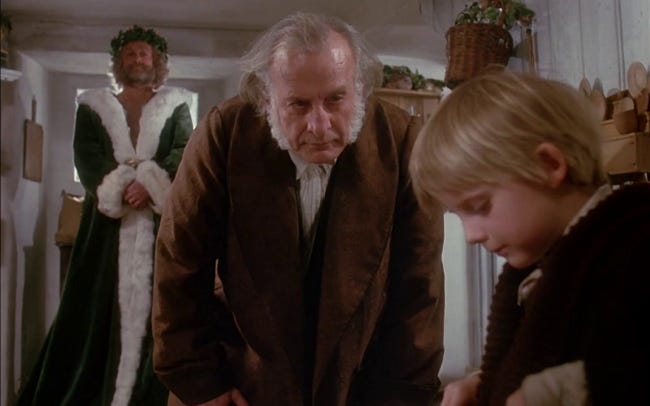12 Days of Cinematic Christmas #4: A Christmas Carol (1984)
Directed by Clive Donner. Starring George C. Scott, Roger Rees, David Warner, and Susannah York.
It’s fairly common to hear people cite The Muppet Christmas Carol as their favorite rendition of Charles Dickens’ perennial holiday masterpiece, and I don’t blame them. It still stands as perhaps the greatest Muppet movie ever made, yet somehow manages to be faithful in spirit to the Dickens text. I myself adore that movie and always will, but for people who also want to experience the story the way Dickens actually wrote it (dramatically, without talking puppets), and are sifting through the countless other adaptations looking for a quality version, you cannot go wrong with this 1984 made-for-tv adaptation starring the magnificent George C. Scott.
With the same faithfulness as the Muppet version, but with more of the Victorian gothic tone of Dickens’ prose, brought vividly to life with stately production design and colorful acting, director Clive Donner follows the novella text not only in story but in style. Just as Dickens was all too aware of the poverty surrounding him, Donner films the snow-covered London set as a bustling city where joy and poverty are forever intermingled. To quote another famous Dickens story, “it was the best of times, it was the worst of times”, and yet, even in a freezing house without enough to eat, the spirit of Christmas lives in the hearts of the impoverished Cratchit family. But of course, the joyful spirit the poor folk of London carry is met with a sneer from Ebenezer Scrooge, the infamous miser who hates Christmas and the idle people who celebrate it. Played throughout history with varying levels of grotesquery (from Alastair Sim, to Albert Finney, to the legendary Michael Caine Muppet performance), George C. Scott stands as my personal favorite depiction of the miserable Scrooge. Why? Because he doesn’t act miserable. He acts happy in his greed, perfectly content to hoard his wealth and condescend toward people who dare ask for charity. His complacency in his own greed is the highlight of Scott’s performance, because it makes it all the more apparent how in need of redemption he is. In other versions, he’s grumpy and mean spirited, but here, he’s just passing through life happy to be a miser, unaware how miserable he truly is. Once he is visited by the Ghosts of Christmas Past, Present, and Future, and is shown the error of his ways, we slowly watch the scales fall from his eyes, and it’s a deeply moving performance from Scott, as Scrooge looks into his own soul for the first time in years. After going on his spiritual journey with the Christmas ghosts, and he comes to his final moment of repentance, the tears he cries feel truly earned, as do our own.
The spirit of redemption has a strong tradition in Christmas tales, as it should, and many famous holiday classics, including It’s a Wonderful Life, owe a great deal to Dickens for laying the groundwork for holiday stories of repentance and redemption. For myself, this version of A Christmas Carol is a necessary companion piece to It's a Wonderful Life, and has become an annual Christmas tradition in our home. The story has been told time and again, but stripped of bells and whistles (or puppets), and told in a faithful, straightforward way, the beauty of Dickens still rings true, and still holds the power to soften our hearts towards our fellow men.
“And so, as Tiny Tim observed,
God bless us, everyone.”




